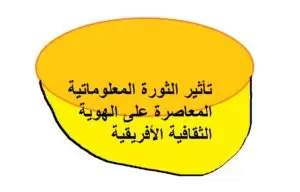تأثير الثورة المعلوماتية المعاصرة على الهوية الثقافية الأفريقية
دراسة تطبيقية على السودان / الجزائر / المغرب
تعتبر الهوية الثقافية الى حد ما هي تصور لحالة الثقافة الجمعية التي تعتمد على مبدأ القومية ، وهي تعبير عن كيان معنوي له خصائصه وتفاعلاته ، وتتجلى في عدة عوامل للجماعة الاجتماعية كالتاريخ المشترك والاجتماع والتفاعلات الاجتماعية المتعددة ، دينياً واقتصادياً وسياسياً ،وهي سياق تاريخي متصل متحرك وليس ساكن ، ومنفتح وليس مغلق ، مرن وليس جامد ، وتعتبر الهوية الثقافية الأفريقية

تجسيد لما سبق من تفصيل ، بيد أن الهوية الثقافية الأفريقية واجهتها عدة محاور مثلت إشكاليات رئيسة أمام بناء المجتمع الأفريقي المتحد هويةً وثقافة ، جزء من هذه الإشكاليات مرتبط بالدين مسلم / مسيحي ، عربي / زنجي ، جزء منها مرتبط بالثقافة نفسها سياسية اجتماعية وغيرها ، بالإضافة لهذه الإشكاليات الداخلية ، برزت العولمة في تجلياتها المعروفة عبر وسائل ثورة المعلومات والاتصالات التي قفزت بالمجتمع الأفريقي من نقاشات وحراك الهوية الأفريقية والجدل الدائر حولها الى فضاء ثورة المعلومات التي كسرت الحواجز الثقافية والمجتمعية ونقلت نقاشات مسألة الهوية الثقافية الأفريقية الى مدى آخر يتداخل فيه الوافد بالقومي ويجسد تحدي أمام معظم المجتمعات الأفريقية .
تحاول الورقة تحليل ما سبق بالتطبيق على المجتمع السوداني والجزائري والمغربي في مسألة الهوية الثقافية بين الوافد والقومي في ظل ثورة المعلومات والاتصال المعاصرة ، وفي ضؤ المتغيرات القومية والإقليمية والدولية الراهنة .
مشكلة الدراسة
تحاول الورقة التأكد من المدى الذي أثرت به الثورة المعلوماتية المعاصرة على الهوية الثقافية الأفريقية في ضؤ المتغيرات الراهنة .
فرضيات الدراسة
- أثرت الثورة المعلومات والاتصالات المعاصرة في صياغة شخصية افريقية مستلبة للخارج الأجنبي أكثر من الدائرة الداخلية القومية .
- تطور استخدام وسائل ثورة المعلومات والاتصالات المعاصرة من قبل المجتمعات الأفريقية في ظل تدني مستوى الوعي بشكل عام والقومي بشكل خاص .
- المشكلات الاجتماعية المعاصرة تعكس المدى الذي نجحت فيه وسائل الثورة المعلوماتية والاتصالية المعاصرة في زعزعة ثقة الشعوب الأفريقية بهويتها الثقافية .
- التغير الاجتماعي الكبير في جل المجتمعات الأفريقية يعكس نجاح الاستلاب الثقافي عبر ثورة المعلومات والاتصالات كأداة من أدوات تفكيك وتركيب المجتمعات
أهمية الدراسة
تنبثق أهمية الدراسة من خلال أن المجتمع الأفريقي قبل أن يحسم الجدل الدائر حول الهوية ، يتعرض لوسائل اتصال وإعلام تعمل على نشر قيم ومفاهيم وثقافات قد تؤدي الى تغيير هويته الثقافية الى هوية ثقافية أخرى قد تقترب أو تبتعد أو تناقض الهوية الثقافية الأصلية ، مما قد يترتب عليه استجلاب مشكلات للمجتمع الأفريقي المنهك بالمشاكل الاجتماعية .
منهج الدراسة
تستخدم الورقة المنهج التاريخي والوصفي التحليلي والمنهج المقارن ومنهج النظم .
حدود الدراسة المكانية
السودان – الجزائر – المغرب
حدود الدراسة الزمانية
2005 م – 2015 م
د.فاطمة عمر العاقب[1]
[1] كلية العلوم السياسية والدراسات الإستراتيجية ،جامعة الزعيم الأزهري ،السودان
